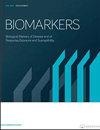Serum prealbumin level as a biomarker of survival outcomes in patients with gastric cancer: a meta-analysis.
IF 1.9
4区 医学
Q3 BIOTECHNOLOGY & APPLIED MICROBIOLOGY
引用次数: 0
Abstract
BACKGROUND Previous studies have reported inconsistent results on the association between serum prealbumin level and survival outcomes in patients with gastric cancer. This meta-analysis aimed to determine the serum prealbumin level as a biomarker of survival outcomes in gastric cancer patients. METHODS Two independent reviewers conducted a thorough search of PubMed, Embase, and Web of Science databases until April 17, 2024. Studies reporting the association between serum prealbumin level and survival outcomes and presented the multivariable-adjusted relative risks for gastric cancer patients were included. The pooled HR and 95% CI were used to assess the strength of the association. RESULTS Twelve studies, with a total of 9,351 patients were included in the meta-analysis. The combined data showed that low serum prealbumin level was associated with shorter overall survival (HR 1.65; 95% CI 1.42-1.91) and disease-free survival (HR 1.39; 95% CI 1.14-1.70). Subgroup analysis showed that low serum prealbumin level significantly predicted poorer overall survival, regardless of patients' age, sample sizes, cutoff value for prealbumin level, and follow-up time. CONCLUSIONS Low serum prealbumin level is an independent prognostic biomarker for shorter survival outcomes in patients with gastric cancer. Assessing serum prealbumin levels could potentially improve risk stratification for this disease.作为胃癌患者生存预后生物标志物的血清前白蛋白水平:一项荟萃分析。
背景以前的研究对血清前白蛋白水平与胃癌患者生存结果之间的关系报道不一。方法两位独立审稿人对 PubMed、Embase 和 Web of Science 数据库进行了全面检索,直至 2024 年 4 月 17 日。纳入的研究报告了血清前白蛋白水平与胃癌患者生存结果之间的关系,并给出了经多变量调整后的相对风险系数。结果荟萃分析纳入了 12 项研究,共有 9351 名患者。综合数据显示,低血清前白蛋白水平与较短的总生存期(HR 1.65;95% CI 1.42-1.91)和无病生存期(HR 1.39;95% CI 1.14-1.70)相关。亚组分析表明,无论患者的年龄、样本量、前白蛋白水平的临界值和随访时间如何,血清前白蛋白水平低都能显著预测较差的总生存期。评估血清前白蛋白水平有可能改善这种疾病的风险分层。
本文章由计算机程序翻译,如有差异,请以英文原文为准。
求助全文
约1分钟内获得全文
求助全文
来源期刊

Biomarkers
医学-毒理学
CiteScore
5.00
自引率
3.80%
发文量
140
审稿时长
3 months
期刊介绍:
The journal Biomarkers brings together all aspects of the rapidly growing field of biomarker research, encompassing their various uses and applications in one essential source.
Biomarkers provides a vital forum for the exchange of ideas and concepts in all areas of biomarker research. High quality papers in four main areas are accepted and manuscripts describing novel biomarkers and their subsequent validation are especially encouraged:
• Biomarkers of disease
• Biomarkers of exposure
• Biomarkers of response
• Biomarkers of susceptibility
Manuscripts can describe biomarkers measured in humans or other animals in vivo or in vitro. Biomarkers will consider publishing negative data from studies of biomarkers of susceptibility in human populations.
 求助内容:
求助内容: 应助结果提醒方式:
应助结果提醒方式:


